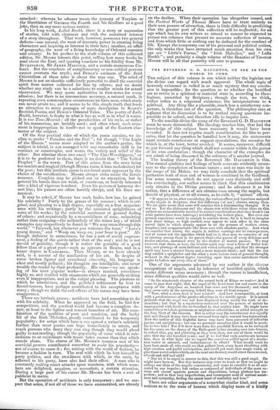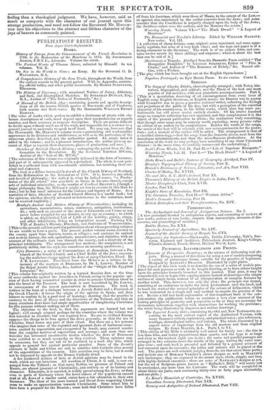THE REVEREND G. D. HAUGHTON, ON SEX IN THE WORLD
TO COME.
THE subject of this volume is one which neither the logician nor the divine can regard with much approval. The whole topic of
heavenly existence is veiled in so much mystery that any conclu-
sion is impossible ; for the question as to whether the beatified are to revive in a spiritual or material state is, according to theo- logians, unsettled by Scripture ; though the text, we think,
rather refers to a corporeal existence, the interpretations to a spiritual. Any thing like a plausible, much less a satisfactory con- jecture, is therefore out of the question. The philosopher sees at a glance that its discussion is to be ranked among questions im-
possible to be solved, and therefore idle to inquire into.
To the sensible divine the essay of the Reverend G. D. HAUGHTON must be more distasteful. His theology teaches him, that had the knowledge of this subject been necessary it would have been revealed. It does not require much consideration for him to per- ceive, that let the question be handled how it may, the statements must contain conclusions or suggest speculations, the occasion for which is, at the least, better avoided. It seems, moreover, difficult to put forward any thing which shall not contain within it the germs of its own confutation ; though the character of the examples do not admit of being discussed in the columns of a secular journal The leading theory of the Reverend Mr. HAUGHTON is this. The mental qualities and feelings of both sexes are evidently neces- sary to the completion of human nature ; and as man was made in the image of his Maker, we may fairly conclude that the spiritual perfection both of man and of woman is combined in the Godhead. For some reasons, which do not appear very distinctly and still less convincingly, our author seems to think that this combination only obtains in the Divine persons ; and he advances it as his notion, that a difference of sex obtains even among the angels, but devoid of physical, or at all events, as he calls it, "animal" erects.
" It appears to us, after considering the various offices and functions assigned to the angels in Scripture, that this difference [of sex] obtains among them. We are quite aware that some will consider this a dishonouring. thought. It is not so. Let the dishonour and the shame rest with those whose ideas on this subject are so inextricably involved in animal considerations that they deem it (as some purists have done marriage) unbefitting the holiest place. But even our present experience would be enough to confute them; for is it hard to imagine that those beings, so high exalted, may appear to each other in the same sacred light in which already appear to us the persons of mother, sister, daughter, and unapproachable like them save with absolute purity. And when we consider that among the angels is neither marriage nor its consequences, and of course not the appetites which lead to it, then may we conceive of sex as existing among them in its purest ideal—the parent of every delicious and tender emotion, unstained even by the shadow of mortal passion. We may conceive that there, as here, the lovelier spirit may wear a form of frailer tex- ture, and plumage of more brilliant and varied colouring, and that the stronger spirit may have a stouter frame and a more majestic tread ; and that the one may exhibit a sprightlier and the other a more serious turn of general thought, without in the slightest degree trenching upon that entire sacredness which ought to hallow our every idea of them."
One of the arguments advanced by our author is the diverse occupations of angels, and by inference of beatified spirits, which render different sexes necessary ; though the reason is insufficient, since different qualities would serve as well.
" In the nineteenth chapter of the second book of Kings we read—' And it came to pass that night, that the angel of the Lord went out and smote in the camp of the Assyrians an hundred four score and five thousand ; and when they arose early in the morning, behold they were all dead corpses.'
" Now, what a stern deed is here related ! And how incompatible, at least with a predominance of the gentler affections in the terrific agent. It is indeed probable that the angel was not here displayed doing visibly the work of de- struction; but that by a mysterious command over the powers of nature he impregnated with death the air breathed by that mighty host. He might have caused them to inhale poisonous or sulphurous exhalations, or added strength to the fiery blast of the simoom. But in either case the interference was equally real, and though it may have been screened from sight, was not less tremendous. Now the author of this frightful havoc may have been possessed of inflexible justice and uprightness ; but can we persuade ourselves that it would be possi- ble to lore him? For if it drew tears from the youthful Xerxes, as he surveyed his fine army on the shores of the Hellespont before crossing over into Greece, to reflect that, gay and glittering as they were then, not one of them would be alive that day one hundred years ; and if we feel that such sentiments became him, then in what light can we regard the conscious wilful agent of a desola- tion vaster in amount, and instantaneous in effect? What mould must he have been made of, who could see that gallant host, every heart throbbing with high emotion and joyful anticipation, and could yet wave that magic wand, or give those secret orders which, ere the next sun dawned, would strew them around, all cold and stiff and still?
" Nor let it be urged in answer to this, that this was still a good angel. He might have been so. But this instance may serve to teach us that we ought to enlarge our ideas of the angelic community, and cease to consider it as all ani- mated by one impulse; but rather as composed of individuals of the most va- rious and almost opposite powers and dispositions, beings glorious but im- perfect; and in that very imperfection, and consmuent need of mutual assist- ance and sympathy, finding the surest bond of cordiality and love."
There are other arguments of a somewhat similar kind, and some notions as to the state of heaven which display more of a kindly feeling than a theological judgment. We have, however, said as much as comports with the character of our journal upon this strange production, and need not follow the Reverend Mr. HAUGH- Tom into his objections to the abstract and lifeless character of the joys of heaven as commonly painted.



























 Previous page
Previous page